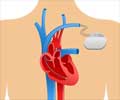The key to the survival of pregnant women with heart failure is a multidisciplinary team-based approach, involving cardiac and maternal/fetal/newborn specialists to team up to save the mom and baby.

‘Integrated efforts by doctors from multi-disciplines have helped save the critically ill mother and the growing fetus.’





"This case represents an enormous team effort and shows what it takes to see a critically-ill patient through the course of a unique and very challenging illness," said Kismet Rasmusson, DNP, FNP, of the Intermountain Healthcare Heart Institute. The 36-year-old patient was 22 weeks pregnant when she came to an Intermountain hospital with shortness of breath, but no prior history of heart disease.
When doctors realized her heart was failing -- either from idiopathic cardiomyopathy with an unknown cause, or pregnancy associated cardiomyopathy -- she was transferred to the Intermountain Medical Center Heart Institute.
Cardiomyopathy leads to heart failure - a disease of the heart muscle that makes it harder for the heart to pump blood to the rest of the body. About 6.2 million Americans have some type of heart failure, including women and men. According to a recent study in JAMA, maternal deaths in the US are high, with 10% of them related to cardiomyopathy, yet 60% of these are preventable with optimal treatments and coordinating care. That's exactly what this team had to offer this patient.
For seven weeks, the mother's care was managed by multiple teams, including heart failure cardiologists with the OB team. To develop a full plan of care, the rest of the team was assembled that included critical care physicians, interventional cardiologists, cardiothoracic surgeons, specialized nurses, cath lab and surgical staff, the staffs of Intermountain Medical Center's Thoracic ICU and Newborn ICU, pharmacists, advanced practice clinicians, and cardiovascular nurses. Social workers also supported both the patient and her spouse.
Advertisement
The baby was delivered at 29 weeks - about 11 weeks early. The team knew the delivery was risky and required advanced planning ahead of time. They held two meetings before the delivery date to discuss the sequence of events and roles of all team members, which included mechanically-supporting the mother's heart during a cesarean-section surgery in the cardiac catheterization lab.
Advertisement
After delivery, the mother's heart remained very weak, so she had a left ventricle assist device (LVAD) implanted, which provided more durable mechanical support for her heart and served as a bridge to a heart transplant, which she received eight months after delivery.
The baby is now nearly five years old, and both the baby and mother are doing well, Rasmusson said.
"The patient in this unique case had the best possible outcome we all hoped for," she added. "Only through the experts within our different teams, having the depth of their skill and experience, and our commitment to delivering the best care could this be possible for women as in this case and for others like her."
Source-Eurekalert















